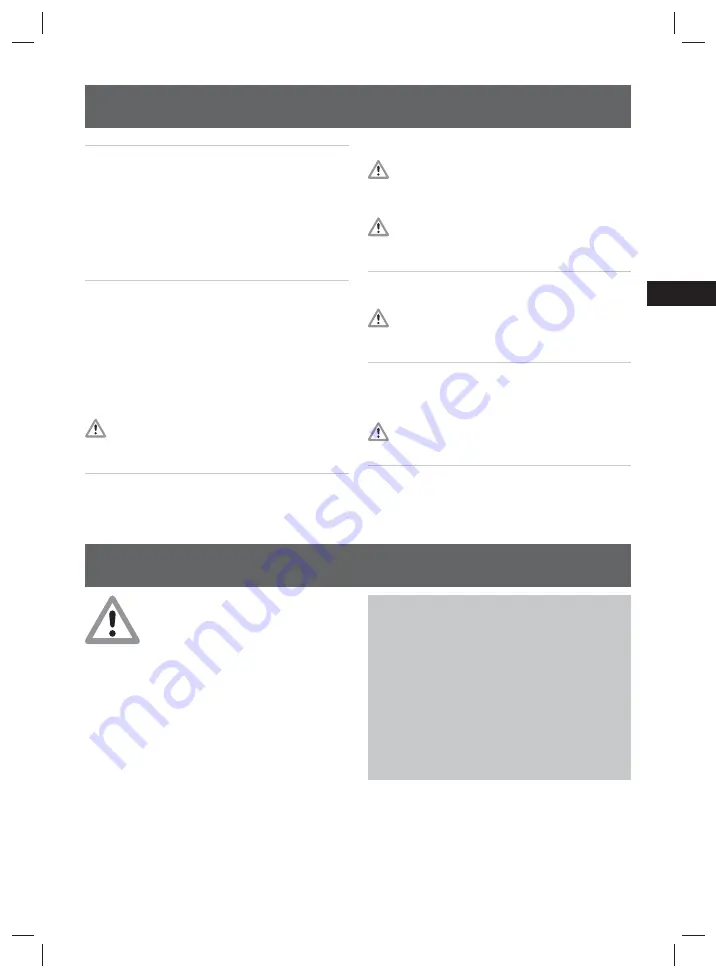
13
FR
LIST OF COMPONENTS
fig. 1
A
Head support buckle
B
Baby carrier buckle/strap
C
Safety buttons
D
Shoulder strap buckle
E
Lumbar belt adjuster
F
Lumbar buckle
G
Bib
H
Elastic band
I
Locking clip
HOW TO WEAR THE BABY CARRIER
fig. 2
Wear the baby carrier by inserting the left and right
shoulder straps.
fig. 3
Fasten the side buckles (
D
).
fig. 4
Adjust the length of the shoulder straps by pulling
the belts.
fig. 5
Fasten the lumbar buckle (
F
) behind your back.
fig. 6
Adjust the lumbar belt around your hips by pulling
the ring (
E
).
fig. 7
Wrap the remaining portion of the belt and secure
it with the elastic band (
H
).
fig. 8
Then insert it into the locking clip (
I
).
WARNING! Make sure that the belts are correctly
positioned and adjusted and that the buckles are
securely fastened before use.
POSITION OF THE BABY: FACING THE PARENTS
fig. 9
Close one side of the baby carrier by attaching the
support buckle (
B
).
fig. 10
Sit the child facing the parents, making sure that he
or she correctly inserts the legs into the lower openings.
fig. 11
Fasten the buckle (
B
) on the opposite side and
completely tighten the baby carrier.
WARNING! Firmly support your child at all times
while you sit him or her in the baby carrier.
fig. 12
Close the side safety buttons (
C
).
WARNING! Closing the side safety buttons is
fundamental to ensure that the baby carrier is used
correctly.
HEAD SUPPORT
fig. 13
Insert the baby’s arms into the side upper openings
and hook the respective buckles (
A
).
fig. 14
WARNING! The child must be positioned
facing the parents until he/she can keep his head
upright independently (about two months of age).
POSITION OF THE BABY: FACING THE WORLD
fig. 15
After accommodating the child, fold the head
support outward.
fig. 16
Close the safety buttons (
C
) and the buckles of the
head support (
A
).
fig. 17
WARNING! Firmly support your child at all
times while you sit him or her in the baby carrier.
HOW TO GET THE BABY OUT OF THE BABY CARRIER
Perform the above operations in the opposite order and,
while supporting the child firmly, get him/her out of the
baby carrier.
It is recommended that special care be taken when
performing this operation.
INSTRUCTIONS
AVERTISSEMENTS
• IMPORTANT!
LIRE
ATTENTIVEMENT ET
CONSERVER POUR
CONSULTATION FUTURE.
NE PAS TENIR COMPTE DES MISES
EN GARDE ET DES INSTRUCTIONS
FOURNIES PEUT S’AVÉRER TRÈS
DANGEREUX POUR VOTRE ENFANT.
• VOUS ÊTES RESPONSABLE DE LA
SÉCURITÉ DE VOTRE ENFANT.
•
AVERTISSEMENT! NE JAMAIS
LAISSER VOTRE ENFANT SANS
SURVEILLANCE. FAIRE LE MAXIMUM
D’ATTENTION LORSQU’ON UTILISE
LE PRODUIT.
•
L’ÉQUILIBRE DE LA PERSONNE
PEUT ÊTRE AFFECTÉ PAR TOUT
MOUVEMENT QU’ELLE ET L’ENFANT
PEUVENT FAIRE.
• FAITES ATTENTION LORSQUE VOUS
VOUS PENCHEZ EN AVANT OU SUR LE
CÔTÉ.
•
LE PORTE-ENFANT N’EST PAS
ADAPTÉ AUX ACTIVITÉS SPORTIVES.
•
Ce porte-bébé est utilisable
uniquement pour transporter l’enfant
de sa naissance (poids minimum de
3,5 kg) à 9 kg.
• Consultez un médecin avant d’utiliser
Summary of Contents for Front
Page 2: ...EN 13209 2 2015 NF EN 13209 2 F vrier 2016...
Page 4: ...4 2 3 1 G B A C I H F E D C A B F D D D...
Page 5: ...5 4 5 6 7 E F F H...
Page 6: ...6 8 9 12 13 10 11 I B B B B C A A C...
Page 7: ...7 14 15 16 17 A A...
Page 23: ...23 RU 3 5 9 4 6 20...
Page 24: ...24 RU Inglesina 12 3 12 3 Inglesina Inglesina Baby Inglesina Inglesina Inglesina inglesina com...
Page 31: ...31 EL k 3 5 9 4 6...
Page 34: ...34...



































